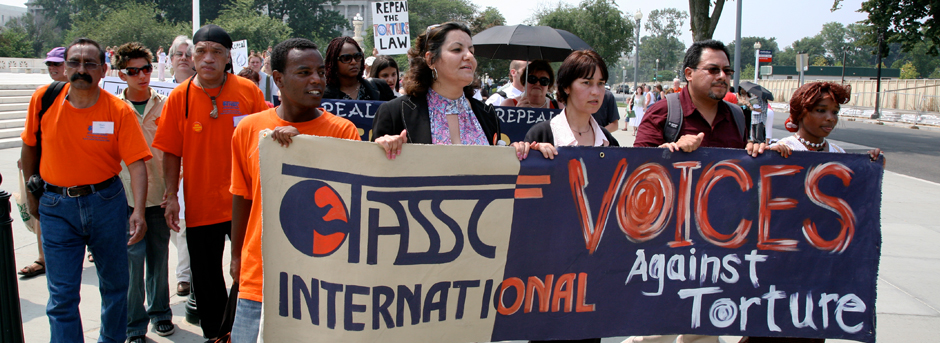Sustainable peace: Ending torture
On June 22-23, members of the Maryknoll Office for Global Concerns attended the 19th Annual June Torture Survivors Week conference and advocacy day in Washington, D.C., organized by Torture Abolition and Survivors Support Coalition (TASSC).
On June 22-23, members of the Maryknoll Office for Global Concerns attended the 19th Annual June Torture Survivors Week conference and advocacy day in Washington, D.C., organized by Torture Abolition and Survivors Support Coalition (TASSC). The following article was published in the July-August 2016 issue of Newsnotes.
The conference began with keynote speaker Juan Mendez reflecting on his six-year term as UN Special Rapporteur on Torture. He lamented the lack of sufficient funding for his position, which limits him to visiting only one or two countries per year to analyze the treatment of prisoners and publish a report of recommendations for the governments – one of the main functions of his position. Mendez also noted the challenge of only being able to visit countries that extend an invitation to him. This prevents him from investigating governments who may be the worst offenders and, in a sense, punishes those who make a goodwill attempt to improve their treatment of prisoners. In his tenure he has visited Mexico, Brazil, Uruguay, Morocco, Western Sahara,Tajikistan and Georgia, among others. He did not receive responses to requests he made to Iran, Egypt, Zimbabwe, Saudi Arabia, and the United Arab Emirates.
Following Mendez’s lecture, a panel composed of Ghanaian political analyst Nii Akuetteh, Ethiopian journalist Simegnish Mengesha, and Sudanese human rights activist and torture survivor Adlan Ahmed Abdelaziz spoke about a range of issues, including U.S. support of African dictators throughout history, essentially condoning torture and inhuman treatment. Mengesha described the Ethiopian government’s crackdown of demonstrators in the Oromo region. Abdelaziz spoke about the ongoing conflict in Sudan and suggested that the U.S. government tie sanctions against the Sudan government to human rights violations, not just joint intelligence cooperation.
The afternoon was dedicated to educating the audience about the urgent need to expand the eight asylum offices around the U.S. which process asylum cases. Thousands of applications are filed each year and until recently, asylum seekers waited three or four months from the time they filed the application until having an interview with an officer who either grants asylum or refers the case to immigration court. Largely due to the influx of Central American refugees, the backlog of asylum applications has risen dramatically – from 33,000 to 144,000. Asylum officers are overwhelmed by the number of “credible fear interviews” and by temporary reassignments to the Middle East as Refugee Corps officers. Survivors are now waiting up to three years for interviews. In the meantime, these individuals often lack stable housing and employment and face the burden of not knowing the fate of separated family members.
As part of TASSC’s initiative, partipants had the opportunity to put their concern into action by meeting with staff members of Congressional offices on June 23. Survivors shared their personal accounts of abuse and asked for Congressional support. Janel, a man from Cameroon, described being imprisoned and tortured by the government for participating in the Cameroon Renaissance Movement, a nonviolent political party. He was able to flee to the United States and begin the asylum process. Over a year has passed since Janel submitted his application, leaving him fearful for the safety of his family back in Cameroon.
Other survivors shared similar heartbreaking stories to Congressional aides. Together with representatives from the Maryknoll Office for Global Concerns and other faith-based and civil society groups, they asked Senators to sign Resolution 432, a statement which encourages respect for human rights and democracy in Ethiopia. This resolution could set a precedent for pressuring countries which receive U.S. aid to uphold human rights at home. Additionally, Senators and Representatives were asked to write letters to the director of U.S. Citizenship and Immigration Services, Leon Rodriguez, calling his attention to the desperate need to finance approximately 270 more asylum officers this year, as well as to urge the House and Senate appropriations committees to distribute funds for the 25 new judge teams required to meet the demands of the increase in asylum cases. The additional asylum officers and judge teams would drastically reduce the length of time between submission of the asylum application and the interview and eliminate the backlog.
If taken, these actions would bring survivors of torture considerably closer to obtaining justice both in the U.S. and in their home countries.

